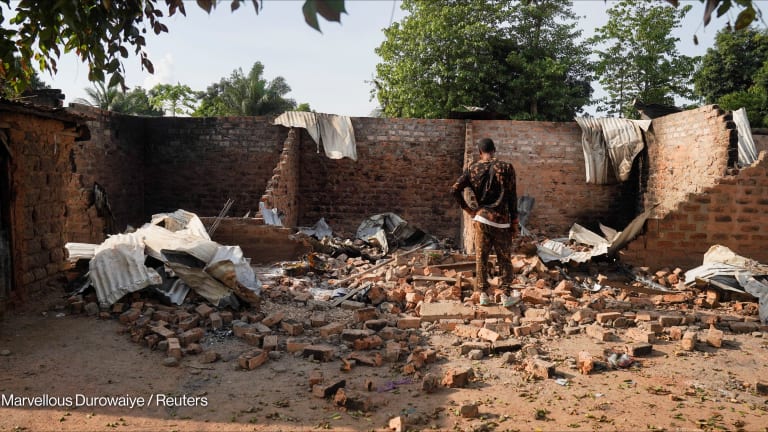
This is an ongoing story as the Senate considers the legislation. We will have an update soon.
WASHINGTON — The Global Fragility Act is expected to move one step closer on Thursday to a full Senate vote with a procedural move, but is likely to face opposition from four key senators, according to Sen. Chris Coons.
Coons, a Democrat from Delaware, said the bill will be hotlined on Thursday, a legislative procedure that seeks to pass a bill by voice vote rather than having senators cast individual votes. Senators can either consent to passing the bill without casting their vote, or, if they object to the legislation, place a hold on it. That prevents the bill from voice vote passage and delays full Senate consideration until enough votes can be secured.
“That means the beginning of the very hard work of chasing down the four members of [the Senate Foreign Relations Committee] who voted against it, several of whom will now almost certainly hold it,” Coons said Thursday at a conference on global fragility in Washington. “That means months of close-in work with very well-known to everybody here senators who frankly vote against anything that expands foreign aid.”
Coons, who is a co-sponsor of the bipartisan legislation, said he expects Republican Sens. Ted Cruz of Texas, Rand Paul of Kentucky, John Barrasso of Wyoming, and Ron Johnson of Wisconsin to object to the bill. The four voted against passing the Global Fragility Act out of the Senate Foreign Relations Committee last month.
“We’re then going to have to figure out ways to get them to release their holds,” Coons said. “This is the hard, hold them on the floor, have them say no, find a way to work to yes, figure out what we have to do, give them some vote on something we don’t like and don’t care about … This is hard work.”
US House passes Global Fragility Act
Last month, the U.S. House of Representatives passed a bill laying out a new 10-year strategy that unites the State Department, USAID, and Defense Department around a new approach to preventing extremism and stabilizing fragile states.
The Global Fragility Act, the House version of which passed last month, outlines a new U.S. approach to fighting fragility and extremism by uniting the State Department, U.S. Agency for International Development, and Defense Department around a whole-of-government strategy to invest in prevention efforts.
It builds off the release of last year’s Stabilization Assistance Review in acknowledging that the three agencies need to find ways to work more effectively together in conflict and fragile settings with a focus on prevention.
If the bill passes, the Trump administration will identify five pilot countries or regions in which to deploy the new, streamlined approach in fragile states.
“We cannot afford not to invest in prevention,” said Sen. Todd Young, a Republican from Indiana. “You end up paying so much more on the back end, so we need to be a lot more intelligent and responsible stewards of [public funds] during this time of limited resources.”
Both Coons and Young endorse a provision in the Senate bill, which is not included in the House version, that would establish a global fund to raise money from other governments and donors for prevention efforts. Young said the ideal scenario would be having the U.S. provide seed money and then getting further contributions from other G-7 countries and the Gulf Cooperation Council. He suggested the fund could also see involvement from the World Bank.
Success of the approach outlined in the Global Fragility Act will depend upon defining very specific goals and targeting spending to achieve them, said Deputy Assistant Secretary of State for the Bureau of Conflict and Stabilization Operations Pete Marocco.
“Why are we not looking at every single dollar spent on CVE government-wide?”
— Pete Marocco, deputy assistant secretary of state, Bureau of Conflict and Stabilization Operations“Whole-of-government and ‘by, with, and through’ are not a panacea for security and stabilization,” Marocco said. “Spending our way to success is just not going to happen. Less, in this case, and many times, can mean more.”
As outlined in the Global Fragility Act and the Stabilization Assistance Review, the State Department would be the lead agency coordinating a whole-of-government approach, with USAID being the lead implementer, and the Defense Department playing a supporting role. Success with State at the helm will rely on the department getting out into the field, and acknowledging “cultural weaknesses,” Marocco said.
“We have an extremely risk-averse culture at the State Department,” Marocco said. “As a culture within the department, we are going to have to become more comfortable with expanding our comfort zone.”
The U.S. government must also have a better system to track where money on related efforts for countering violent extremism are being spent government-wide. One solution to this problem is the State Department’s Center for Analytics, Marocco said.
“Why are we not looking at every single dollar spent on CVE government-wide? We need to be able to tag that money and code it and be able to look and visualize where has that money actually been effective? Where has it been completely ineffective? And what were the types of programs that work?” Marocco said. “We have the capabilities now to do that, but it’s just a matter of activating it within the government because we’re behind the private sector in this regard.”
Search for articles
Most Read
- 1
- 2
- 3
- 4
- 5








